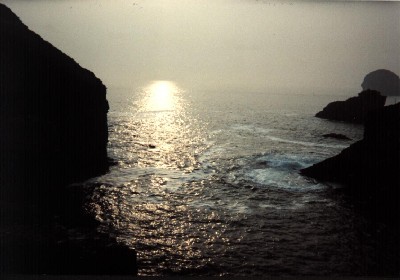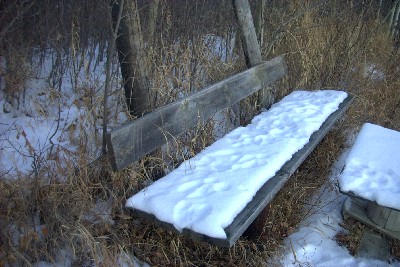Consider this a possible continuation of yesterdays post. (For the most part, I’m indebted to James Alison for the following.)
When he came to it, he found nothing but leaves, for it was not the season for figs. He said to it, "May no one ever eat fruit from you again." And his disciples heard it. (Mark 11)
I heard a sermon several months ago where the pastor made the point that Jesus was not knocking temple sacrifice, or the Temple per se, just the exploitation of people buying the animals to be sacrificed.
But think about this. In Mark’s account of the days surrounding the Jerusalem entrance, Jesus comes to the city, enters the Temple, and just looks around and leaves. The next day on his way back to Jerusalem from Bethany, he curses the barren fig tree, then proceeds to the Temple, clears it out, and leaves the city again. The next morning on the way back again Peter points out to Jesus that the "cursed" tree has withered and Jesus says, "Truly I tell you, if you say to this mountain, Be taken up and thrown into the sea, and if you do not doubt in your heart, but believe that what you say will come to pass, it will be done for you."
Winter birch with nest in Chickakoo Lake Park
 |
I was always confused by the succession of these apparently disparate events and the strange fig-tree subplot. I mean, really, Jesus, first casing the Temple, then, on his way back the next day, wanting figs out of season, he curses the poor tree. Then (perhaps surly and obviously hungry) he rousts the "robbers" from the temple. And then the following day the withered fig tree comes in handy for a teaching on prayer…yes, on faith and prayer, but illustrated by pitching a mountain into the sea?
But now, try reading this succession of events with a non-sacrificial frame of reference. That is, where the Temple is viewed as I believe Jesus viewed it, with indifference at best but more likely as an obstacle to the Kingdom; not just because of it’s notorious ways of exclusion and faction-making inherent in the sacrificial system, but because the true Temple is now here.
Well, when read like this the whole thing comes together. The just-looking-around-indifference to the Temple, then the fig tree (think Temple metaphor) cursing, "may no one eat fruit from you again", then the cleansing as the inclusion of "all nations" and ability to pray "whenever". And the prayer teaching on hurling the mountain into the sea? Well, what makes more sense when the "mountain" in question is the "mount" that the Temple was built on? There’s a good chance that that "mountain" was in view of the fig tree.
As James Alison said, "From now on the Temple is wherever ordinary human beings are engaged together in prayer, in treating each other in a way which builds up, and wherever they are together undoing the world of violent sacrifice."
Technorati Tags: James Alison, Gospel of Mark, Temple Mount, Fig tree, Jesus cleanses Temple, Christianity, Non-sacrificial, Religion, Violence







